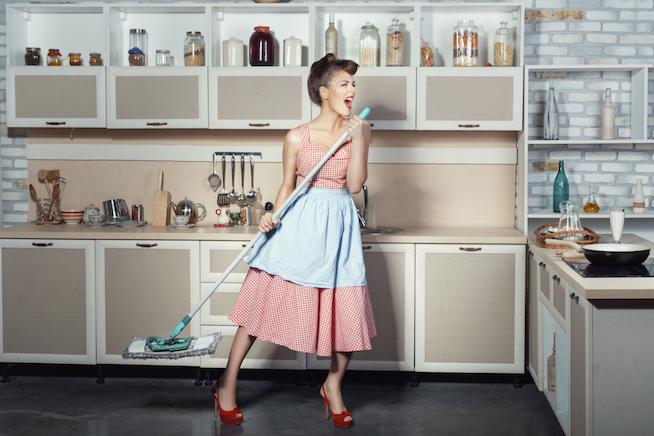
What, you don't use your mop as a mic?
Dear Real-Life Feminist,
I’ve always thought of myself as a feminist, but I recently decided to stop working outside the home and be a full time stay-at-home mom. Somehow, mommy and me time at the library seems less empowering than a career with a paycheck . . . but the career didn’t seem as fulfilling as reading Hippos Go Berserk to my kids. Am I still a feminist if all I do is cook, clean, and wipe little noses?
Totally Imaginary Reader
Dear Imaginary Reader,
What a provocative question and how like my own life! What a funny coincidence!
Being a feminist is such a tricky proposition sometimes, because nobody really knows what a "true" feminist is. Ask five different people what a feminist is and you’ll get seven different answers, and at least one answer will make some very personal presumptions about the state of your armpit hair. I am here to assure you that armpit hair, like career choices, has nothing to do with feminism. Feminism is about acting autonomously for the best interest of you and your loved ones.
As a political philosophy, feminism proposes that women are entitled to all the same rights as men under the law. There was a time when this was a radical notion and it required a whole lot of hard work to make certain crucial elements of that possible. Such as a the right of women to vote. Or to own property. Or to obtain divorce. Or sign contracts. Or use birth control. All that stuff was against the law at various times in America — and remains against the law in some places in the world today. Luckily for us, our feminist foremothers did all the hard work and we can now do all of those things without a pesky father or husband getting in our way. And since all of that legal framework is in place for us already, we’re given the luxury of wondering if we’re feminist enough when we make certain choices.
So, the answer to your question about a choice to stay home with kids instead of working a paying job is yes. That is the act of a feminist. You had choices, you made one, no one coerced the result, and if you later feel it’s the wrong choice, you can do something else.
But let us not forget that, for many women, the choice of whether or not to work is made for them. Not by the law or by a coercive man holding power over them, but by overwhelming circumstances that make it impossible for her to take advantage of the full range of choices we have legally. You see, women, particularly single women with children, are all too often locked in a cycle of poverty that turns their lives into a struggle to access basic needs such as safe housing, transportation, food, and medical care.
Their circumstances may mean living in areas where their children are receiving a substandard education, but financial constraints make it impossible to relocate for better schools. They are tied to low-paying jobs and/or government benefits that they cobble together to cover their basic expenses, plus the often staggering cost of childcare. These women could make different choices, legally speaking, and may really, really want to make different choices, but circumstances have conspired to prevent them from doing anything different than what they are doing.
In order to boost the access to the full range of feminist-driven life choices for women, we need to see a few changes in this country. Subsidized childcare and low-cost continuing education (with childcare included, because what good is a cheap community college class in computer skills if you don’t have some place to leave the kids?) would be programs that help women take advantage of all that feminism wants them to have.
Early feminism was all about the right to make choices. Feminism today needs to be about ensuring all women have access to choices. The stay-at-home moms and working moms of the world can team up to make sure that happens.




![By Magicland9 [CC BY-SA 3.0 (https://creativecommons.org/licenses/by-sa/3.0)], from Wikimedia Commons By Magicland9 [CC BY-SA 3.0 (https://creativecommons.org/licenses/by-sa/3.0)], from Wikimedia Commons](/sites/default/files/styles/profile/public/images/article/2019-06/Bell.png?itok=gWp6s_Y0)



